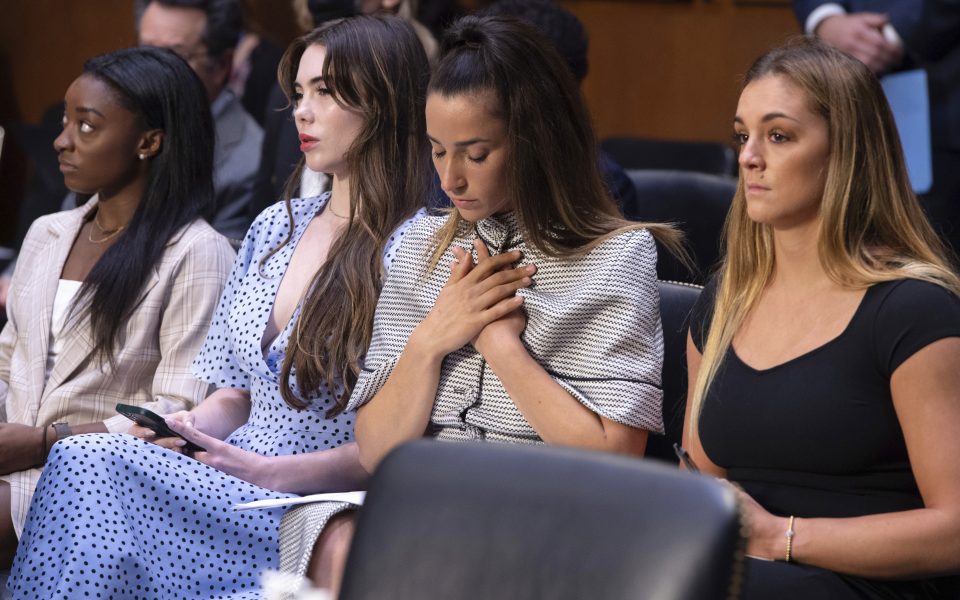Biles and her teammates rip FBI for botching Nassar abuse case

Sitting at a witness table alongside three of her former gymnastics teammates, Simone Biles broke down in tears while explaining to a Senate committee that she doesn’t want any more young people to experience the kind of suffering she endured at the hands of Lawrence Nassar, the former national team doctor.
“To be clear, I blame Larry Nassar, but I also blame an entire system that enabled and perpetrated his abuse,” Biles, 24, said Wednesday as her mother, Nellie Biles, sat nearby, dabbing her eyes with a tissue.
Biles and hundreds of other girls and women — including a majority of the members of the 2012 and 2016 US Olympic women’s gymnastics teams — were molested by Nassar, who is now serving what amounts to life in prison for multiple sex crimes. His serial molestation is at the center of one of the biggest child sex abuse cases in US history.
McKayla Maroney, an Olympian in 2012, also testified, describing in detail how Nassar repeatedly abused her, even at the London Games, where she won a gold medal. She said she survived a harrowing ordeal when she and Nassar were at a competition in Tokyo, certain she “was going to die that night, because there was no way he was going to let me go.”
“That evening I was naked, completely alone, with him on top of me, molesting me for hours,” she said.
In 2015, when Maroney was 19 years old and before she had even told her mother what Nassar had done, she described her abuse to an FBI agent during a three-hour phone call from the floor of her bedroom. When she finished, Maroney said the agent asked, “Is that all?” She said she felt crushed by the lack of empathy.
“Not only did the FBI not report my abuse, but when they eventually documented my report 17 months later, they made entirely false claims about what I said,” Maroney testified. “They chose to lie about what I said and protect a serial child molester rather than protect not only me but countless others.”
In a remarkable turn, FBI Director Christopher Wray acknowledged the agency’s mishandling of the case and apologized to the victims. He said the FBI had fired an agent who was involved in the case early — the one who interviewed Maroney. It was the first time anyone at the agency had submitted to public questioning about the FBI’s failure to properly investigate a sexual abuse case that shook the sports world to its core.
Wray, who became FBI director in 2017, said he was “heartsick and furious” when he heard that the FBI had made so many errors in the case before he took charge of the agency.
“I’m sorry that so many people let you down again and again,” Wray said to the victims. “I am especially sorry that there were people at the FBI who had their own chance to stop this monster back in 2015 and failed, and that is inexcusable. It never should have happened, and we are doing everything in our power to make sure it never happens again.”
Wray said that one of the agents initially involved in the case, Michael Langeman, was fired two weeks ago. When asked why the case was mishandled in the first place, Wray said the agents had made many basic mistakes that clashed with how the FBI usually conducts investigations.
“I don’t have a good explanation for you,” Wray said, later adding, “On no planet is what happened in this case acceptable.”
Wray said that as a result of the Nassar case the FBI had strengthened its policies, procedures, systems and training, including emphasizing that agents report abuse cases to state and local law enforcement. He promised that steps in future investigations would be “quadruple checked” so that there was not “a single point of failure.”
Sen. Patrick Leahy, D-Vt., said Wray’s answers would not provide any solace to the gymnasts who testified before the Judiciary Committee and that they weren’t good enough “for the American people,” either.
Like the gymnasts who testified, Leahy and several other senators on the committee expressed outrage that the agents who mishandled the case have not been prosecuted. He said sports and government officials and anyone else who “turned a blind eye” to Nassar’s abuse should face criminal charges.
“A whole lot of people should be in prison,” Leahy said.
The Justice Department was not at the hearing to address the lack of criminal prosecutions. Senators said they had asked Justice Department officials to attend, but the officials declined.
The hearing came two months after the Justice Department’s inspector general released a report that sharply criticized the FBI. The agency’s errors allowed Nassar to continue treating patients at Michigan State University, where he practiced, and in and around Lansing, Michigan, including at a local gymnastics center and a high school, even though he had left USA Gymnastics under a cloud, with both gymnastics officials and the FBI aware of the abuse accusations.
Nassar molested more than 70 girls and women under the guise of medical treatment while the FBI failed to act, the inspector general’s report said.
To open the hearing, Sen. Dick Durbin, D-Ill., the committee chair, scolded the FBI for its “dereliction of duty,” “systematic organizational failure” and “gross failures” in the case.
“It shocks the conscience when the failures come from law enforcement itself, yet that’s exactly what happened in the Nassar case,” Durbin said.
Two FBI agents who took the initial abuse reports no longer work for the agency, including Langeman, the supervisory special agent in the FBI’s Indianapolis office who first spoke to Maroney. Wray said the agency had been waiting to receive the inspector general’s report and had to go through the proper disciplinary process before firing Langeman.
Langeman, who was not immediately available for comment, was not named in the inspector general’s report, but his actions and multiple crucial missteps were carefully described. The report said that Langeman should have known that Nassar’s abuse was probably widespread, but that he did not investigate the case with any urgency.
After Langeman interviewed Maroney — who was just one of the three elite gymnasts who gave USA Gymnastics details of Nassar’s abuse — the agent did not properly document that interview or open an investigation. In an interview report Langeman filed with the FBI 17 months after he spoke to Maroney, who was not named in the report, he included statements she did not make, according to the report.
Like other agents initially involved in the case, Langeman did not alert local or state officials about the allegations of abuse by Nassar, violating FBI policy that says crimes against children “invariably require a broad, multijurisdictional, and multidisciplinary approach.”
Langeman later said he had filed an initial report about Nassar, asking for the case to be transferred to the FBI’s Lansing office. But the paperwork wasn’t found in the FBI database, the inspector general’s report said.
W. Jay Abbott, a former special agent in the Indianapolis office, also is no longer with the FBI. He voluntarily retired in 2018. The report said he had made false statements to Justice Department investigators and “violated FBI policy and exercised extremely poor judgment under federal ethics rules.”
According to the report, Abbott had been angling for a job with the US Olympic & Paralympic Committee, which he discussed with Steve Penny, who was then the president of USA Gymnastics. Several senators expressed surprise and disgust that Abbott was able to leave the FBI without being disciplined.
Hundreds of girls and women who were abused by Nassar have been waiting for years to hear from the FBI about the mistakes in the case. Biles has been vocal about wanting to know “who knew what, and when” about Nassar. She said the effects from his abuse linger. She won a silver medal and a bronze this summer at the Tokyo Olympics after dropping out of the team competition, saying she was struggling mentally.
“The scars of this horrific abuse continue to live with all of us,” she said at the hearing, referring to all the victims, including Maggie Nichols, who also testified. Nichols is often referred to as “Athlete A” because she was the first national team athlete to report Nassar’s abuse.
Aly Raisman, an Olympic gold medalist who testified at the hearing, has publicly asked for an independent investigation of the Nassar case. She pressed senators for that on Wednesday, saying that it was hard for her to speak at the hearing but that she did so to protect others and force change within sports and law enforcement.
“The FBI made me feel like my abuse didn’t count and that it wasn’t real,” she said.
Raisman, 27, told senators that she wondered if she was going to be able to walk out of the hearing room after the proceedings.
After the first time she spoke publicly about her abuse, in 2017, she said, she was so shaken that she couldn’t stand up in the shower and had to sit on the floor of the tub to wash her hair. Since then, she said, there have been times when she was so sick from the trauma that she had to be taken to a hospital by ambulance.
She said testifying Wednesday would set her back, too.
“This might take me months to recover,” she said. “I just wanted to make that clear.”
[This article originally appeared in The New York Times.]






